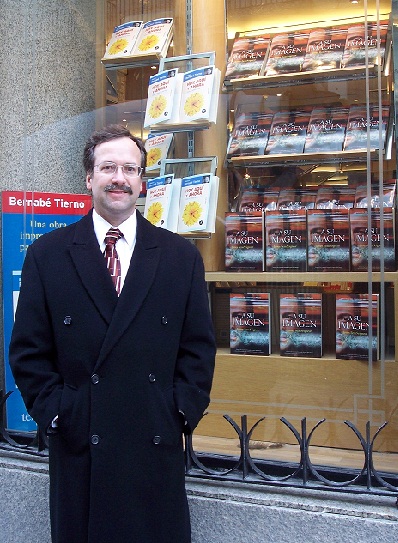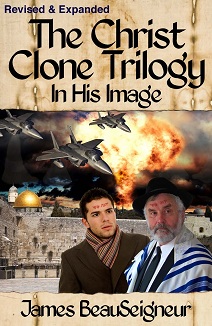Please Welcome...James BeauSeigneur
This month our interview guest is Christian speculative fiction author James BeauSeigneur. James BeauSeigneur is a former intelligence analyst who has worked for the National Security Agency and the Defense Intelligence Agency. As an author, he has worked with the Department of Homeland Security by serving on “Terrorist Red Cells” to speculate on possible terrorist targets and tactics. He is a former newspaper publisher, and he taught political science for two years at the University of Tennessee in Knoxville. In 1980, he was the Republican nominee for U.S. Congress running against Al Gore. He’s been married for 38 years and has two daughters and four grandchildren. James currently consults with several Fortune 500 companies in support of their marketing efforts to government customers. His background brings a special focus on scientific and political realism to his novels, which have been published in 12 languages. And now, the interview... WhereTheMapEnds: Catch us up with you. What have you been doing lately?
James BeauSeigneur: I’ve spent the last several
months preparing for a new release of
The Christ Clone Trilogy. I’ve
done a major re-edit to account for technological changes that have
occurred over the past ten years and to dramatically sharpen the pace
and tempo of the story. I’ve also added some scenes. But the most
significant change is that I’ve integrated a study guide that allows
the reader to see the scriptural basis for how the story plays out. WhereTheMapEnds: That sounds like a great “author’s preferred” edition of the book. Yes, the ability to easily embed links adds a new dimension to reading. In the expanded edition of Sharon Hinck's The Restorer (released by my independent publishing house, Marcher Lord Press) we did something similar in the eBook. There are new chapters that, through links, can be read right in sequence with the original material. It is very cool, and more convenient than having to flip to the end of a print book. What is your favorite speculative novel of all time, and why is that your favorite?
James BeauSeigneur: My favorite, which was also the
first book I ever read, is
1984 by George Orwell. Like most
speculative fiction, the story is really about us—in this case, about
our possible future. Orwell didn’t exactly intend it in this way, but
I think Big Brother in 1984 is a type of Antichrist. Big
Brother is able to sway what and even how people
think. What makes Orwell’s story so terrifying is the understanding
that it doesn’t take godlike powers to achieve this level of mind
control. That, plus the realization that people like Hitler and Stalin and
Mao (on the grand scale), and Charles Manson and so many other
political and cult leaders have achieved it over and over again in the
real world. WhereTheMapEnds: I may have to go read that one again! What made you want to write Christian speculative fiction? James BeauSeigneur: I’ve been interested in “last days prophecy” since I was about six years old. I was driven to understand how the events of prophecy could play out in the real world. I read numerous books on the subject, both fiction and nonfiction, but wasn’t satisfied.
The nonfiction prophecy writers either lack
imagination or feel restricted from using it. They also tend to ignore
continuity, by which I mean that they deal with the prophetic judgments in
isolation. Their explanation of later judgments all too often ignores
the lingering effects of the earlier judgments. In a way, fiction is
actually more disciplined because it requires a storyline. Nonfiction
is written in sections, and those sections are subject to internal
contradictions and inconsistencies. WhereTheMapEnds: How was your first idea for a Christian speculative novel received (by anyone: spouse, friends, parents, agent, publisher, readers, reviewers, etc.)?
James BeauSeigneur: I knew before I started my first
book that finding an agent and a publisher would be difficult. I had a
friend from high school who was an agent, so I thought that might be
my road into the business. I decided to draft the first ten chapters
and outline the rest and then ask him to take a look. I promised my
wife that, if the agent didn’t think there was a real possibility for
publishing it, I’d drop the idea.
WhereTheMapEnds: Wow, 40,000 copies of a self-published book. That’s remarkable. What is your favorite speculative genre to read? To write? If they’re different, talk about that. James BeauSeigneur: I love time travel, even far-fetched time travel — as long as it’s not just a lame excuse to have modern characters fighting dinosaurs. I’ve given considerable thought to finding a plausible time travel storyline, but haven’t found it yet. Maybe in the future. :) WhereTheMapEnds: Interesting. Our interview guest last month, Brian Godawa, also mentioned time travel as his favorite. I wonder if that indicates a niche in need of more literary exploration. Hmm... So, what advice would you give to someone who aspires to write and publish Christian speculative fiction?
James BeauSeigneur: Unless you’re writing for your
own enjoyment and that of a few friends, you’re not just writing a
book: You’re going into business. It will require a lot of work that
has nothing to do with writing.
If you’re successful there, then consider adding print-on-demand
(POD). But be careful. There are a lot of POD companies that are very
difficult to work with. Several friends have highly recommended a
company called Lightning Source. There may be other good companies out
there, but all the other stories I’ve heard about POD companies have
been negative. WhereTheMapEnds: Huh. Last month's guest also hyped the advantages of today's POD technology. I'm beginning to wonder if I'm not doing a bit of time-traveling right now! That said, Lightning Source is one of the outfits I use for Marcher Lord Press. I used them exclusively at first, and I was very happy with them. Then I learned about Snowfall Press, who I’m using for most of the printing we do at MLP. They offer the same quality as LightningSource, but they’re less expensive, don’t have all those fees, and are a Christian company. What’s the best part about writing and publishing Christian speculative fiction? James BeauSeigneur: I think for
any writer, having people you don’t know (and therefore, who have no
reason to lie) write to you and tell you that they enjoyed your
creative work is a pretty great feeling. Close behind that, for me, is
simply being able to read the story myself. When I start writing, I
know the main points I need to convey in a scene, but the characters
have their own personalities and points of view. I never know how the
story might change as I give the characters free rein to act and
interact. They sometimes take me in directions I never expected.
That’s great fun.
WhereTheMapEnds: How amazing! What writing project(s) are you
working on now? WhereTheMapEnds: Wow. Sounds great, James. That's All for This TimeAnother terrific interview! Thanks again to James BeauSeigneur for stopping by. Be sure to visit him online. Also, if you missed any of our previous interviews with other speculative authors, including Frank Peretti, Jerry Jenkins, Karen Hancock, Tosca Lee, and Ted Dekker, you can read them here. Come back next month for an interview with another heavy hitter in the world of Christian speculative fiction.
|


